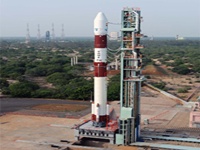India’s Mars orbiter mission all set for Tuesday launch
04 Nov 2013
The Indian Space Research Organisation (ISRO) is all set to launch its first interplanetary satellite mission to Mars, from the Satish Dhawan Space Centre at Sriharikota, in Andhra Pradesh, on Tuesday, 5 November.
 The Mars orbital mission, called `Mangalyaan', using a PSLV C 25 rocket, is scheduled to lift off at 2.38 p.m from the spaceport, about 100 km from Bangalore, on Tuesday.
The Mars orbital mission, called `Mangalyaan', using a PSLV C 25 rocket, is scheduled to lift off at 2.38 p.m from the spaceport, about 100 km from Bangalore, on Tuesday.
''The countdown for the launch, which commenced yesterday has been progressing smoothly. Things are normal. We are busy with preparatory work,'' an ISRO spokesman said.
The PSLV rocket uses mixed oxides of nitrogen (MON) as fuel and the mission completed filling of the fuel in the PS4 rocket at 5 pm on Sunday, 3 November.
ISRO's Launch Authorisation Board had, on 1 November, given its consent for launch of the Mars orbiter mission after a successful launch rehearsal the previous day.
The 44.4-metre tall rocket has been mounted on the pedestal of the first launch pad at the spaceport.
The rocket is covered by a 76 metre tall mobile service tower, designed to withstand a wind speed of 230 km per hour, in case of a cyclone.
It will be removed as the countdown comes closer to the launch.
A complex network of ground stations has been laid out for keeping an eye on the various phases of PSLV-C25 / ISRO's Mars Orbiter Mission, including the launch, Earth bound manoeuvres, Heliocentric phase as well as the Martian phase.
Additionally, two ship-borne terminals have also been deployed in the southern Pacific Ocean to cover critical events during the launch phase.
After satellite separation from the launch vehicle, the spacecraft operations will be controlled from the spacecraft control centre of ISRO telemetry, tracking and command network (ISTRAC) in Bangalore.
Vehicle tracking stations at Port Blair, Bylalu near Bangalore and Brunei are on an alert mode, while sea-borne terminals on board Shipping Corporation of India's vessels SCI Nalanda and SCI Yamuna have taken their positions at South Pacific Ocean, ISRO sources said.
The sea-borne terminals on board SCI ships are to capture the crucial moment of the vehicle injecting the satellite on Earth's orbit somewhere above South America.
The rocket is expected to take over 40 minutes to inject the satellite on Earth's orbit after take-off.
Once launched, the satellite is expected to go around Earth for 20-25 days before embarking on a nine-month voyage to the red planet on 1 December and reach the orbit of Mars on 24 September 2014.
If the Rs450-crore MOM mission turns out to be a success, ISRO will be the fourth space agency in the world to have sent a mission to Mars.
European Space Agency (ESA), National Aeronautics and Space Administration (NASA) of the US and Roscosmos of Russia are the only three agencies which have so far sent their missions to the red planet.
Only 21 of the total of 51 missions sent to Mars by various countries have so far been successful.
This brochure on PSLV C25 launch Vehicle gives insights into the configuration of the launch vehicle, flight sequence, mission design and glimpses of pre-launch operations.
While Mars has drawn more space missions than the rest of the planets in our Solar system, only a third of all the missions to the red planet have tasted success.
Success would depend on the technological prowess in the domains of navigation, propulsion system design, deep space communication systems, ground segment and thermal and radiation management.


















